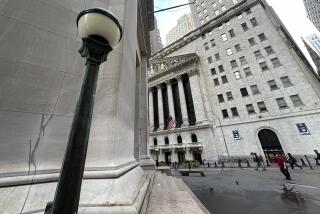Korean Exports Surge; Stocks Follow the Lead
TOKYO — South Korea is successfully cranking up its export machine and attracting foreign investment, twin steps that could help it dig its way out from under a crushing burden of foreign debt, a raft of new statistics showed Monday.
The country was buoyed by a trade ministry announcement that it achieved a record $3.3-billion trade surplus in February as exports--which have been lagging expectations--skyrocketed 21.6% over the same month last year, to hit $11.4 billion. Imports plunged 29.5% to $8.1 billion.
Those figures brought Seoul’s trade surplus so far this year to $4.8 billion, a big help as the country struggles to adjust to the terms of a $60-billion International Monetary Fund financial bailout package.
Foreign investors, meanwhile, poured a net $1.34 billion into South Korean stocks in February, also a record. Stocks gained further support Monday from reports that banks in Japan--which hold about $24 billion in Korean debt, more than any other country--have agreed to support a plan for rescheduling short-term Korean debt.
These factors combined to push Seoul stocks to a new high for the year. The benchmark Kospi index rose 15.37 points, or 2.75%, to close Monday at 574.35. That put the index up 11% in just four trading days--and up slightly more than 50% in dollar terms since Jan. 1. The trend of foreign buying continued Monday, with net purchases by foreigners of $107 million on total turnover of $858 million.
The won gained 4.2% to hit 1,567 won to the dollar.
Stocks in Tokyo also hit a new high for the year. Though Japan and South Korea continue to face severe economic woes, stocks’ gains in both countries reflect how the focus of Asia’s economic crisis has shifted from Northeast Asia back to Southeast Asia, especially Indonesia, which faces a severely weakened currency and complex political problems.
Tokyo stocks were boosted by comments from a senior ruling party official advocating stronger economic stimulus measures. The Nikkei-225 stock index rose 432.67 points, or 2.6%, to 17,264.34 Monday. The yen also surged, with the dollar falling to 124.82 yen, down 1.90 yen from late Friday in Tokyo.
At midday the Tokyo stock market was modestly lower; South Korea’s market was up 0.5%.
U.S. officials have recognized a turn for the better in South Korea’s international financial standing, even as the country slides toward an austerity-induced recession.
“Korea’s situation is very much improved over where it was at the end of December,” U.S. Treasury Secretary Robert Rubin said recently. Seoul has built its foreign currency reserves “very, very substantially,” Rubin said.
Seoul’s usable reserves totaled $12.4 billion at the end of January, up from $8.9 billion at the end of last year, according to the Bank of Korea. The government has said it wants at least $40 billion in reserves by the end of this year.
Seoul’s favorable trade figures for February were inflated by the export of $1.05 billion worth of gold, made possible by a national gold-collection campaign in which citizens turned in jewelry to be melted into bars for export. But more traditional export products also showed strong growth, with automobiles up 26%, semiconductors up 12% and petrochemicals up 18%.
In Tokyo, Taku Yamasaki, chairman of the ruling Liberal Democratic Party’s Policy Research Council, said more government-controlled funds from Japan’s postal savings and insurance systems should be invested in stocks to prop up prices. He also called for more than 82% of public works funding budgeted for the fiscal year starting April 1 to be spent within six months.
Japanese media on Monday also reported growing expectations that Tokyo will unveil a new economic stimulus package before a May summit meeting of the Group of Seven industrial nations.
Rubin and other top economic officials of the United States and its major European allies have been pressing Japan to spur its economic growth both to ease the broader Asian financial crisis and to hold its growing trade surpluses in check.
Faster growth in Japan could pull in imports that would help other Asian countries earn the foreign exchange needed to pay off debts. It also would help keep Japan’s surplus with the United States from ballooning.
For months, investors in Japan’s markets have been playing a guessing game on how government policy will be decided between Prime Minister Ryutaro Hashimoto’s goal of reducing long-term government deficits and conflicting pressures to give the economy a quick boost through tax cuts and increased public spending.
While the government has announced a variety of measures in recent months meant to boost the economy, investors and analysts have generally responded to those packages with disappointment. The surge in stock prices in recent days has been driven by growing indications that a more powerful stimulus package may be announced in April or May.
Comments such as Yamasaki’s that hold out the promise of bigger steps later this spring are taken seriously by many investors because Hashimoto has strong political reasons to delay any major stimulus package until after the start of a new fiscal year on April 1.
*
* ROLLING ALONG: U.S. manufacturing and construction were up despite Asia’s woes. D3
More to Read
Inside the business of entertainment
The Wide Shot brings you news, analysis and insights on everything from streaming wars to production — and what it all means for the future.
You may occasionally receive promotional content from the Los Angeles Times.










